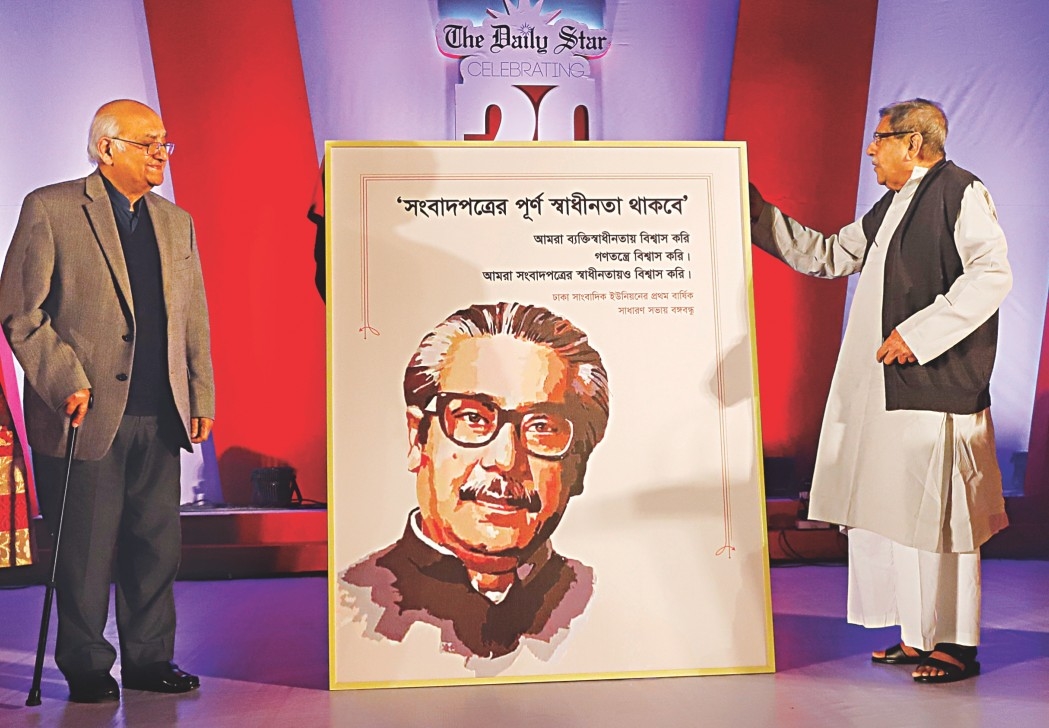Al Fahad
Published:2020-02-13 23:33:49 BdST
Hail the power of one
The wider social impact small individual actions can have and the immense transformative power one single person can harness are often underestimated. There are far too many in the society who are content with injustices and inequalities around them, or resign themselves to sufferings they endure.
But Mohammad Soinuddin Miah and Abdur Rashid -- both farmers -- are not among them.
Soinuddin refused to accept that people in his village -- Chakgagadhar in Tangail's Nagarpur upazila -- would not have a road to go to the nearest market. Tired of stomping through thick mud and waiting for the authorities to build the road, he picked up the shovel himself.
The earth came from his own lands, and after four years of perseverance, Soinuddin single-handedly built a 1.5km clay road, five feet in width and three feet in height.

On the other hand, Abdur Rashid's heart wept at the plight of children with disabilities. He saw first-hand how parents in his village -- Dakkhin Dalgram Parshurampara in Lalmonirhat -- hid such children from the society, and how the children never learned of a world outside their homes. The remote village had none of the facilities required by children with special needs.
There are now more than 200 students in the school, where those who cannot see, are taught in Braille, and those who cannot hear, are taught using sign language.
What Soinuddin, 45, and Rashid, 60, did is by no means a small feat and its extraordinariness lies in its simplicity, in its replicability. Drawing inspiration from them, many may ask themselves: "What if we and everyone around us do the same?"
On the occasion of its 29th anniversary, The Daily Star yesterday honoured these two change makers for their courage to dream big and their commitment to materialising it.

Earlier, this paper ran stories on both the farmers.
Soinuddin and Rashid thanked The Daily Star for the honour.
Speaking at the programme at the capital's International Convention City Bashundhara, Rashid said, "I've a niece who has disabilities. While raising her, I realised the needs of children like her.
"I gave away two-thirds of my land for the school. I feed my students selling my crops. I have never been able to pay my teachers. I spend Tk 18,000- 20000 on their food, books and stationeries per month. I raise this money by selling my harvest. Sometime, my neighbours come to my rescue."

After the end of the speech, The Daily Star Editor and Publisher Mahfuz Anam, who was also on stage, asked the audience, "If this man doesn't inspire us, who will?"
Receiving the award, Soinuddin said, "It was impossible to take anyone to hospital if they fell sick in my village. So I decided to reduce their pain and started making the road on my own."
The audience, made up of readers, patrons, advertisers and well-wishers of The Daily Star, were visibly moved as they came to know their stories.
The two awardees were given Tk 1 lakh each amid cheers from the audience.
Rokia Afzal Rahman, chairperson of Mediaworld Ltd, the owning company of The Daily Star, and Shykh Seraj, a renowned development journalist, handed the crests and cheques to Soinuddin and Rashid.

The ceremony was also attended by politicians, academics, businessmen, diplomats, media personalities, journalists and development workers from home and abroad. It began with the national anthem, which was followed by the screening of a short film on the importance of mother language.
National Professor Anisuzzaman, president of Bangla Academy, unveiled a portrait of The Father of the Nation Bangabandhu Sheikh Mujibur Rahman. He also inaugurated The Daily Star's newly-minted dual-language website, which will provide news contents in Bangla, in addition to in English, with the aim to reach more readers.

While addressing the audience, Rokia Afzal Rahman thanked readers for being with The Daily Star, saying the newspaper has practised the highest form of ethical journalism in the last 29 years.
"Interests of Bangladesh and its people have always been the most important factor. Whatever we did, whatever we are trying to do, we are totally committed to the values of our Liberation War."
Rokia said, "It is a belief that we hold to our heart that freedom of speech and expression lies at the core of evolution of the human mind. Without which none of the discoveries of science and creative writing would have been possible."
Mahfuz Anam, in his address, highlighted the importance of a free media in driving the country forward.
"Journalism was born to tell governments what their masters, the people, feel. It was born to tell how a government should run. It was the communication of the people with power.
"Who will tell the government that the project they are implementing is not working? Only independent journalism [can do that]."
He added that Bangladesh's desire to be a middle-income country is linked to a free press.
Unauthorized use or reproduction of The Finance Today content for commercial purposes is strictly prohibited.


